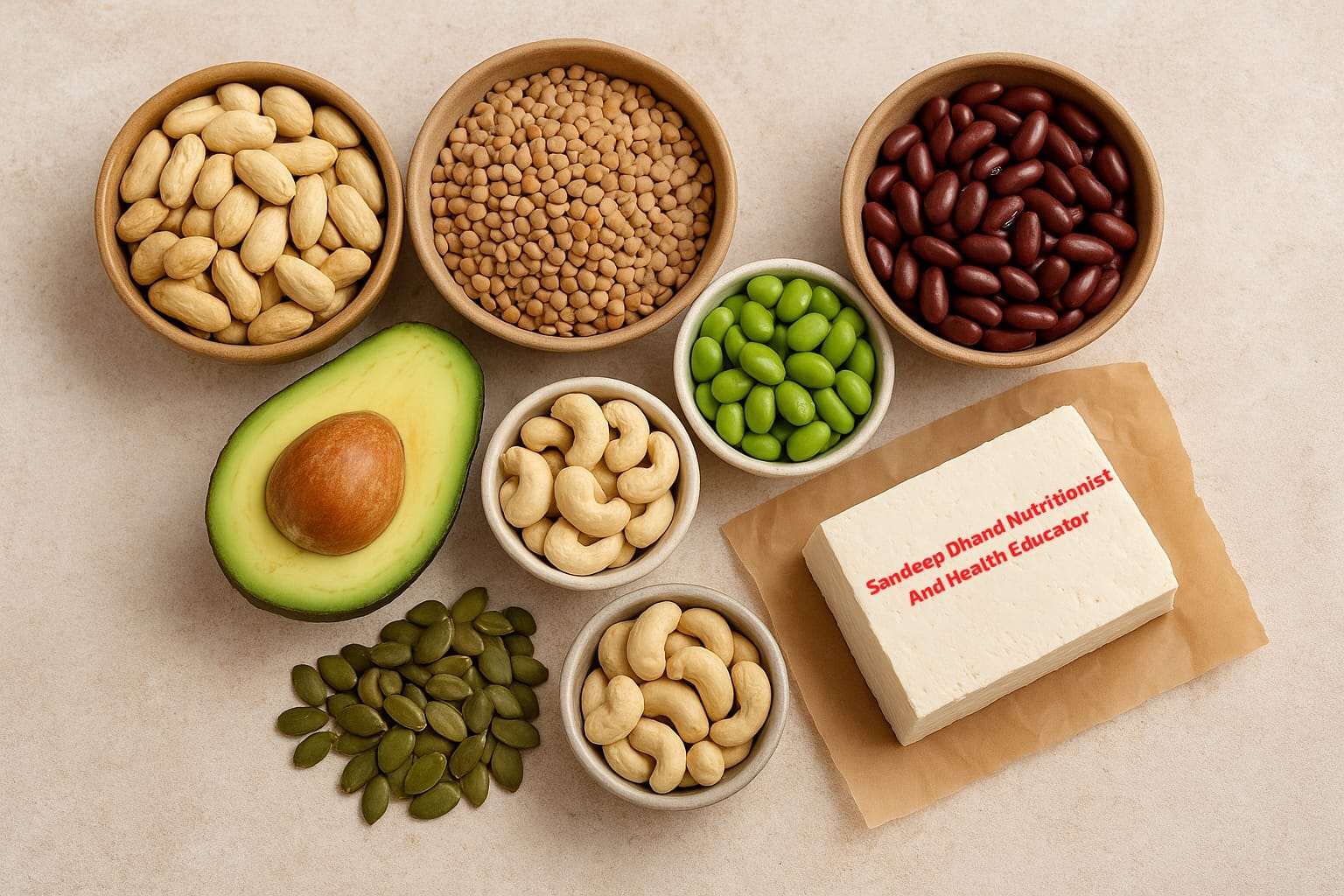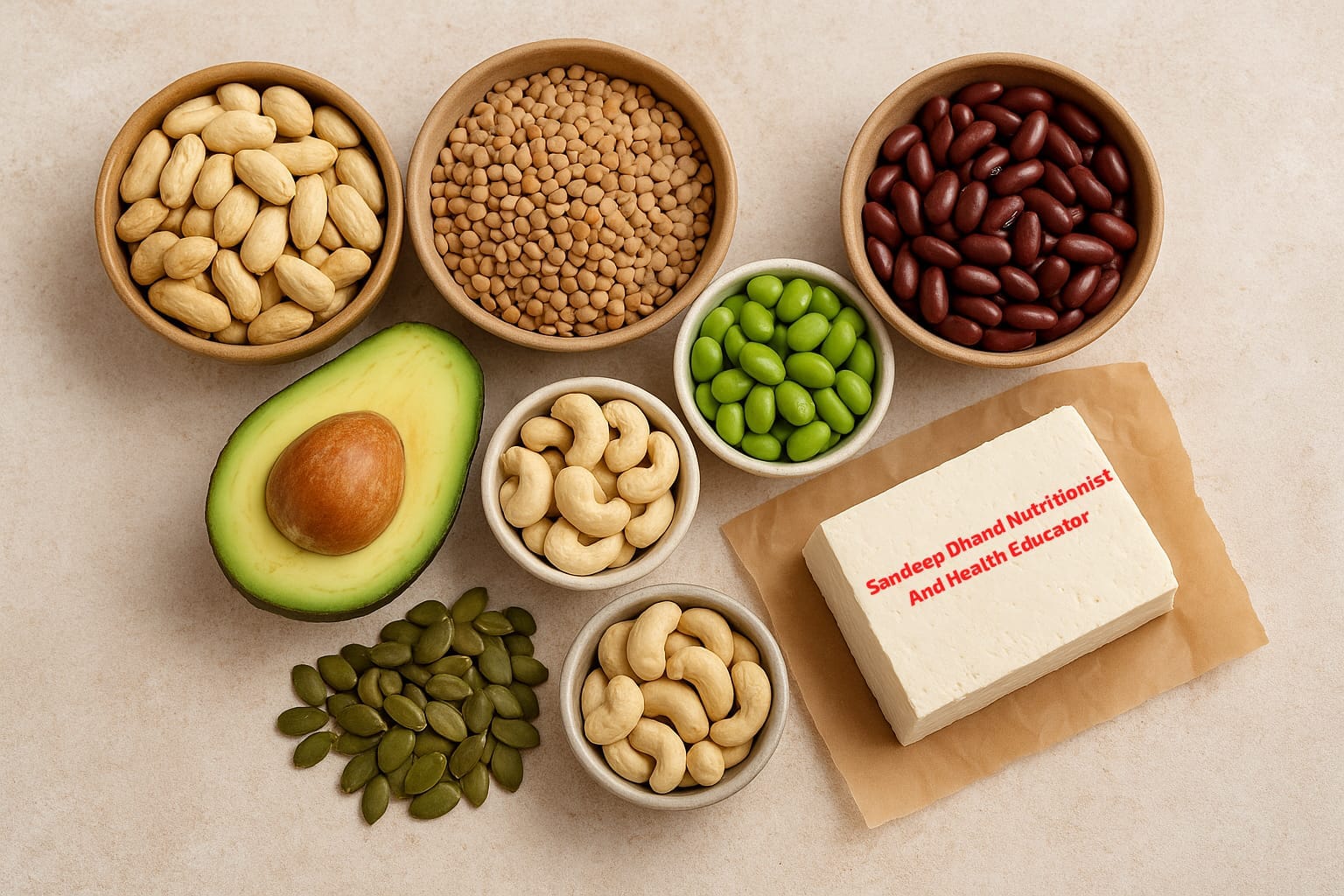Health Desk
Sandeep Dhand
Nutritionist And Health Educator
Introduction
Protein is one of the most important nutrients for the human body. It is the building block of muscles, bones, skin, hair, hormones, and enzymes. Traditionally, many people think that protein mainly comes from animal foods such as meat, eggs, and dairy. However, plants are also a powerful source of protein. For vegetarians, vegans, or those who want to reduce animal products, plant-based protein foods are a healthy choice.

This article explains protein-rich plant foods with their nutritional values, health benefits, and how they can be included in daily meals. All the foods shown in the image—such as peanuts, lentils, beans, nuts, seeds, tofu, and whole grains—will be discussed in detail.
Why Protein is Important
Helps build and repair tissues.
Supports muscle growth and strength.
Produces enzymes and hormones.
Strengthens immunity.
Provides energy when carbohydrates and fats are low.
Maintains healthy skin, nails, and hair.
The average adult requires 0.8–1.0 grams of protein per kg of body weight daily. For example, a person weighing 60 kg needs around 48–60 grams of protein every day. Plant-based foods can easily fulfill this requirement if chosen wisely.
List of Protein-Rich Plant Foods (with Nutrition Value)
Let us now explore each food item shown in the chart with its nutrition content and benefits.
- Peanuts
Peanuts are one of the most affordable and accessible protein-rich plant foods. They are technically legumes but often considered nuts.
Nutrition Value (per 100g roasted peanuts):
Protein: 25.8 g
Carbohydrates: 16 g
Fat: 49 g (mostly healthy fats)
Fiber: 8.5 g
Calories: 567 kcal
Health Benefits:
High in plant protein for muscle strength.

Contains heart-healthy fats.
Rich in magnesium, niacin, and vitamin E.
Good for brain health and energy.
- Fortified Breakfast Cereal
Many cereals are fortified with protein, iron, vitamins, and minerals. Choosing wholegrain and less sugary options is important.
Nutrition Value (average per 100g fortified cereal):
Protein: 8–12 g
Carbohydrates: 65–70 g
Fiber: 6–10 g
Iron: 8–12 mg
Calories: 350–400 kcal
Health Benefits:
Provides quick energy.
Rich in vitamins like B12 and folic acid (important for vegetarians).
Helps in maintaining hemoglobin levels.
- Lentils
Lentils are one of the most popular plant-based protein foods worldwide. They come in green, red, brown, and black varieties.
Nutrition Value (per 100g cooked lentils):
Protein: 9 g
Carbohydrates: 20 g
Fiber: 8 g
Iron: 3.3 mg
Calories: 116 kcal
Health Benefits:
Excellent for heart health.
Supports digestion with high fiber.
Provides slow energy release (low glycemic index).
- Beans
Beans include kidney beans, black beans, pinto beans, etc. They are packed with protein, fiber, and minerals.
Nutrition Value (per 100g cooked beans):
Protein: 8–9 g
Carbohydrates: 22 g
Fiber: 6–8 g
Folate: 130 mcg
Calories: 127 kcal
Health Benefits:
Reduces cholesterol.
Boosts energy and supports heart health.
Good source of folate for brain development.
- Edamame
Edamame are young soybeans eaten as a snack or side dish. They are rich in protein and antioxidants.
Nutrition Value (per 100g boiled edamame):
Protein: 11 g
Carbohydrates: 8.9 g
Fiber: 5 g
Fat: 5 g
Calories: 122 kcal
Health Benefits:
Contains all essential amino acids (complete protein).
Supports bone and heart health.
Reduces menopausal symptoms in women.
- Cashews
Cashews are tasty nuts rich in protein and healthy fats.
Nutrition Value (per 100g cashews):
Protein: 18 g
Carbohydrates: 30 g
Fat: 44 g
Magnesium: 292 mg
Calories: 553 kcal
Health Benefits:
Good for brain and heart.
Improves immunity.
Provides healthy fats for skin and hair.
- Avocado
Avocados are creamy fruits with moderate protein and high healthy fats.
Nutrition Value (per 100g avocado):
Protein: 2 g
Carbohydrates: 9 g
Fiber: 7 g
Fat: 15 g (monounsaturated fat)
Calories: 160 kcal
Health Benefits:
Supports heart health.
Improves digestion.
Helps absorb fat-soluble vitamins.
- Pumpkin Seeds
Pumpkin seeds are crunchy, nutrient-dense seeds full of protein and minerals.
Nutrition Value (per 100g pumpkin seeds):
Protein: 30 g
Carbohydrates: 10 g
Fat: 49 g
Magnesium: 592 mg
Calories: 560 kcal
Health Benefits:
Boosts immunity.
Improves sleep (rich in tryptophan).
Supports prostate and bladder health.
- Tofu
Tofu is made from soybeans and is an excellent source of plant protein.
Nutrition Value (per 100g tofu):
Protein: 8 g
Carbohydrates: 2 g
Fat: 4 g
Calcium: 350 mg
Calories: 76 kcal
Health Benefits:
Contains complete protein.
Good for bone health.
Low in calories and heart-friendly.
- Wholemeal Bread
Wholemeal bread is made from whole grains and provides moderate protein with fiber.
Nutrition Value (per 100g wholemeal bread):
Protein: 9–12 g
Carbohydrates: 47 g
Fiber: 7 g
Calories: 250 kcal
Health Benefits:
Provides steady energy.
Good for digestive health.
Helps in weight management.
- Watercress
Watercress is a green leafy vegetable that surprisingly contains protein.
Nutrition Value (per 100g raw watercress):
Protein: 2.3 g
Carbohydrates: 1.3 g
Vitamin C: 43 mg
Calories: 11 kcal
Health Benefits:
Rich in antioxidants.
Supports immunity.
Promotes skin and hair health.
- Peas
Peas are small but rich in plant protein and fiber.
Nutrition Value (per 100g boiled peas):
Protein: 5 g
Carbohydrates: 14 g
Fiber: 5 g
Calories: 84 kcal
Health Benefits:
Helps in weight control.
Improves heart health.
Supports digestion.
- Pistachios
Pistachios are crunchy nuts loaded with protein and vitamins.
Nutrition Value (per 100g pistachios):
Protein: 20 g
Carbohydrates: 28 g
Fat: 45 g
Fiber: 10 g
Calories: 560 kcal
Health Benefits:
Good for heart health.
Improves gut health.
Provides antioxidants.
- Almonds
Almonds are one of the most popular nuts rich in protein and vitamin E.
Nutrition Value (per 100g almonds):
Protein: 21 g
Carbohydrates: 22 g
Fat: 50 g
Fiber: 12 g
Calories: 579 kcal
Health Benefits:
Improves brain function.
Reduces cholesterol.
Good for hair and skin.
- Wholemeal Spaghetti
Wholemeal spaghetti is made from whole wheat and provides protein with fiber.
Nutrition Value (per 100g cooked wholemeal spaghetti):
Protein: 7 g
Carbohydrates: 35 g
Fiber: 6 g
Calories: 174 kcal
Health Benefits:
Provides long-lasting energy.
Helps control blood sugar.
Supports digestive health.
- Asparagus
Asparagus is a vegetable with a moderate protein content.
Nutrition Value (per 100g cooked asparagus):
Protein: 2.2 g
Carbohydrates: 3.9 g
Fiber: 2.1 g
Calories: 20 kcal
Health Benefits:
Rich in antioxidants.
Supports kidney health.
Helps detoxify the body.
- Chickpeas
Chickpeas (also called garbanzo beans) are protein-rich legumes.
Nutrition Value (per 100g cooked chickpeas):
Protein: 9 g
Carbohydrates: 27 g
Fiber: 8 g
Iron: 2.9 mg
Calories: 164 kcal
Health Benefits:
Improves digestion.
Good for heart health.
Supports muscle strength.
- Walnuts
Walnuts are crunchy nuts rich in protein and omega-3 fatty acids.
Nutrition Value (per 100g walnuts):
Protein: 15 g
Carbohydrates: 14 g
Fat: 65 g
Omega-3: 9 g
Calories: 654 kcal
Health Benefits:
Boosts brain health.
Improves heart health.
Reduces inflammation.
Combining Plant Proteins for Complete Nutrition
Most plant proteins are “incomplete proteins” because they lack one or more essential amino acids. However, by combining different foods, you can get complete protein.
Examples:
Rice + Lentils (Dal-Chawal)
Bread + Peanut Butter
Hummus (Chickpeas + Sesame seeds)
Wholemeal Spaghetti + Vegetables + Nuts
Sample Daily Plant-Based Protein Diet
Breakfast: Fortified cereal with soy milk and almonds.
Snack: Roasted peanuts or edamame.
Lunch: Lentil soup + wholemeal bread + watercress salad.
Evening Snack: Tofu stir-fry with cashews.
Dinner: Wholemeal spaghetti with chickpeas and vegetables.
Before Bed: A handful of walnuts or pumpkin seeds.
This type of diet can provide 60–70 grams of protein daily, enough for most adults.
Conclusion
Plant-based foods are rich in protein, fiber, vitamins, and minerals. They are heart-friendly, sustainable for the planet, and suitable for all age groups. By including peanuts, lentils, beans, tofu, nuts, seeds, whole grains, and vegetables in daily meals, one can easily meet protein needs without animal products.
Eating a balanced mix of these protein-rich plant foods ensures good health, strong immunity, and long-lasting energy.



